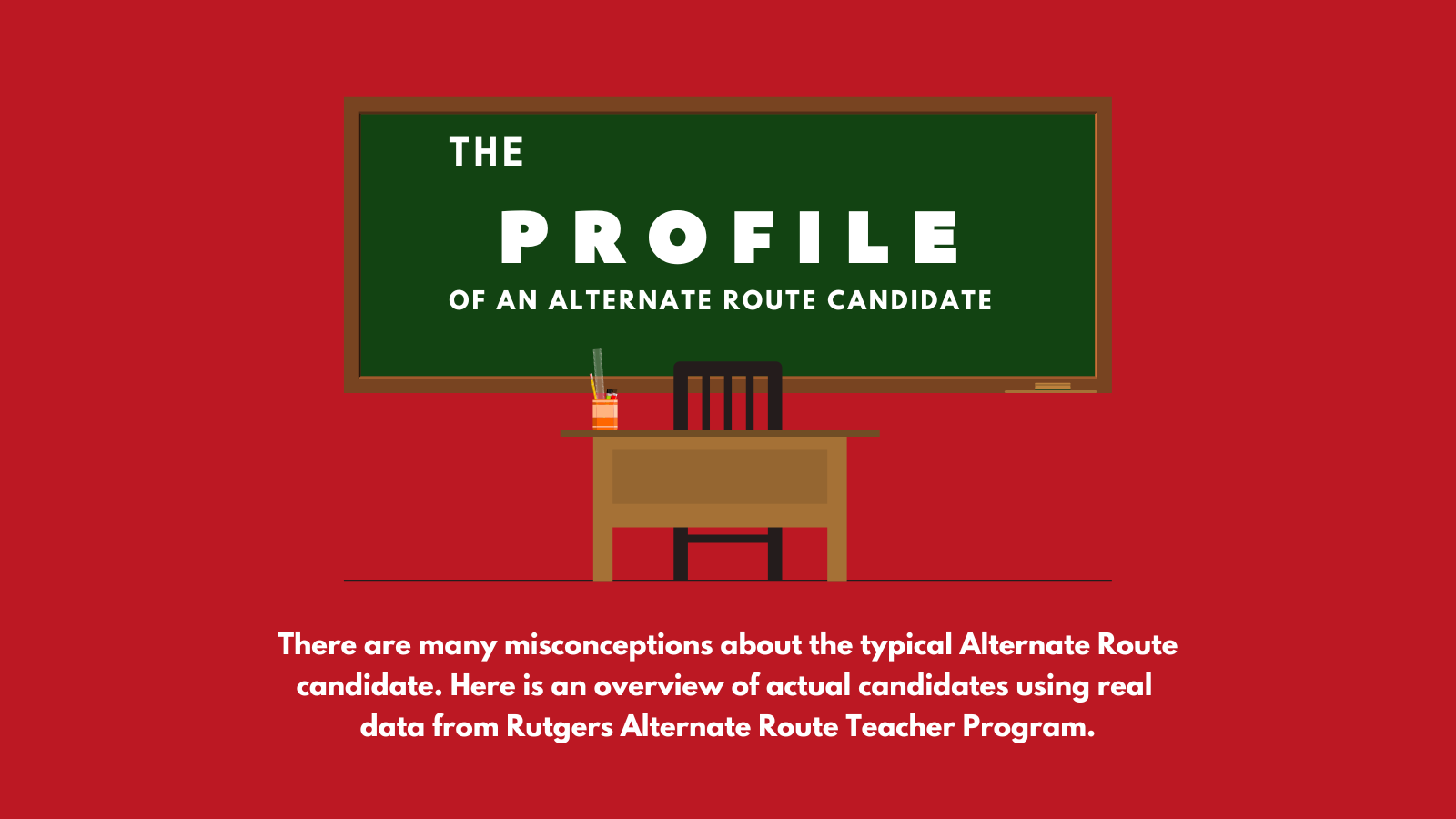Alternate Route Teachers Utilize Their Backgrounds to Diversify School Settings

Diversifying the teaching workforce is a priority for the New Jersey Department of Education, and the Alternate Route program at the Rutgers Graduate School of Education is doing its part to address teacher diversity. Alternate Route candidates bring varying backgrounds, ages and experiences to the classroom, which helps students expand their perspectives.
As a statewide Educator Preparation Program for nontraditional teachers, we help individuals of all backgrounds see themselves in a New Jersey K-12 classroom, navigate the pathway from interest to application, and then develop their craft as teachers. Our deliberate actions to be an inclusive and committed certification partner to the state have expanded the pool of new teachers in the workforce and improved the diversity of teaching candidates.
Below, we’ve highlighted the key characteristics in our alternate route candidates.
Racial and Ethnic Diversity in the Classroom
.png)
With the number of students of color increasing in the classroom, it is imperative that representation is considered in the teaching staff. Multicultural teaching professionals in schools help ensure fairness in disciplinary actions, reduce dropout rates and increase academic achievement for students of all backgrounds.
The Rutgers Alternate Route Program cohort demographics for 2021- 2022 reflect over 30 percent of candidates coming from diverse backgrounds, which is double the national average of nonwhite teachers entering the profession and significantly higher than teacher diversity in the state. According to the NJ Department of Education, New Jersey teachers of color make up 16 percent of the state’s teacher workforce.
Seven percent of Rutgers Alternate Route candidates identify as Black or from African descent, which is slightly higher than the state average. The percentage of Hispanic and Asian American candidates in our program make up 14 and eight percent of our candidates. This representation is significantly higher than other public-school settings, with Latino or Hispanic teachers making up eight percent and Asian teachers at two percent within New Jersey schools.
Alternate Route Candidates Contribute to Diverse Education Settings
.png)
When people think of Alternate Route teachers, they often think that only large urban districts hire them for unexpected attrition; however, our program data reveals diverse placements for these nontraditional candidates.
The overwhelming majority of candidates are hired right at the beginning of the school year, demonstrating principal trust in their potential to promote student learning. Candidates clearly delivered. According to our 2021-2022 principal surveys, 90.48 percent of candidates were rated Average, Above Average or Excellent in the area of Classroom Management Skills. In the area of Knowledge of Pedagogy, 93.66 percent of candidates were rated Average, Above Average or Excellent. Not bad for nontraditional teacher candidates.
Hiring patterns demonstrate that just about any type of district is willing to take a chance on an Alternate Route candidate. Three percent of Rutgers Alternate Route candidates are teaching in private K-12 schools, 16 percent in charter public schools, while 81 percent accepted teaching positions at traditional public schools. The urban-suburban split for our candidates is suburban (54 percent) and urban (30 percent). The remaining 16 percent of candidates are in charter school settings that are hosted in both suburban and urban communities.
Alternate Route Candidates Represent Diverse Age Groups
.png)
The call to teach may come at various stages in life, whether that be during your college experience or after you turn 50. Because Rutgers Alternate Route understands the value of an age-diverse workplace, the program easily helps mature adults transition from other industries into teaching. While about 51 percent of our candidates are recent graduates under the age of 30, mature adults make up the rest of our candidate pool. Sixteen percent of candidates training to become teachers with Rutgers Alternate Route were born in the 1970s, and candidates over 60 years of age make up the other seven percent, proving that age can not hinder a person’s passion to teach. Alternate Route makes it possible to share the gift of education at any age.
If you’re considering following your dream of teaching, Rutgers Alternate Route can offer you the support and training you need to succeed. Be sure to follow Rutgers Alternate Route on Twitter sign up for Alternate Route’s monthly newsletter for more information and stories from the field of education.

 Heather Ngoma has over 25 years of experience collaborating with educators across New Jersey to drive education innovation. She currently serves as the Director of the Rutgers-GSE Alternate Route Program in the Department of Learning and Teaching, a program which helps career changers, recent college graduates, and other aspiring education professionals become licensed teachers in New Jersey. Follow her on Twitter @heatherngoma.
Heather Ngoma has over 25 years of experience collaborating with educators across New Jersey to drive education innovation. She currently serves as the Director of the Rutgers-GSE Alternate Route Program in the Department of Learning and Teaching, a program which helps career changers, recent college graduates, and other aspiring education professionals become licensed teachers in New Jersey. Follow her on Twitter @heatherngoma.





